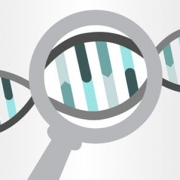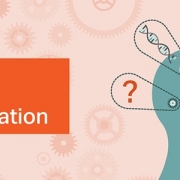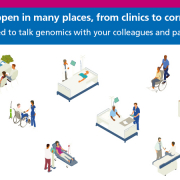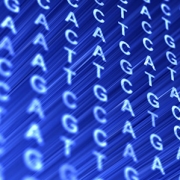New guidance for clinicians on the ethics of genomic testing
Fully revised guide offers clinicians practical advice around consent and confidentiality when supporting patients through genomic testing
Working together as part of the Joint Committee on Genomics in Medicine (JCGM), the Royal College of Physicians (RCP), Royal College of Pathologists and British Society for Genetic Medicine (BSGM) have revised their guidance for healthcare professionals navigating the complex ethical issues that can arise in genomic medicine.
The third edition of Consent and confidentiality in genomic medicine, published today, focuses on the ethical issues arising from the use of genetic and genomic information in the clinic. It covers a broad range of situations that health professionals will increasingly face as genomic testing becomes more prevalent within the health service, and seeks to dispel common misconceptions about consent and confidentiality.
Co-author and honorary consultant in clinical genetics Professor Anneke Lucassen said: “We hear a lot about the technical accuracy, speed and low cost of genomic testing, and expectations of the power of genomics to diagnose and predict run high. To do this justice, we also need a space to consider ethical issues raised by (for example) future and familial predictions from such testing.”
Clinical scenarios
The guidance features real-life examples of what clinicians can do in certain situations, such as when:
- a person is tested and the test results have implications for other family members;
- a person does not want, or finds it difficult, to tell relatives information that may affect their own health outcomes;
- a child’s test results have implications for their health later in life;
- test results reveal unexpected information, for example a disease that is completely unrelated to the reason for the test, or about the genetic relationships between individuals; and
- the results and implications of genomic testing are not clear enough to give definitive medical advice.
Points of best practice
The guide also looks at practical aspects relating to genomic testing, such as:
- a uniform way of recording key features of a clinical consent discussion;
- how new data protection laws and frameworks, for example GDPR, affect clinical practice in genomics;
- how legislation, such as the Human Tissue Act 2004, affects access to stored samples for genetic testing;
- when to communicate new evidence about past genomic results; and
- the use of genomic data for research and insurance purposes.
Ask an expert
While the guidance provides general advice on the factors to consider in a range of situations, it cautions that each case should be approached individually.
If further support is required, it advises healthcare professionals to consult experienced colleagues, the relevant multidisciplinary team, their hospital’s ethics committee or the national Genethics Forum for advice on ethically challenging cases.
A timely update
Dr Helen Firth, chair of the JCGM and consultant clinical geneticist at Addenbrooke’s Hospital, Cambridge, said: “With the increasing use of genomic testing in medicine, this 2019 edition of the JCGM consent and confidentiality guidance is very timely. Grounded in thoughtful consideration of ethical and legal principles, the case examples will enable clinicians to readily grasp how to apply this guidance in their clinical practice.”
Co-author and chair of BSGM’s ethics and policy committee Alison Hall said: “We hope that this revised guidance will be a useful resource to support all health professionals using genetic and genomic tests, and to increase their understanding of the importance of consent and confidentiality when reflecting on their practice.”
You can view and download the new edition of the guidance on the RCP website.









